Planning Tools in Management Accounting for Financial Problems
VerifiedAdded on 2023/06/12
|7
|1510
|363
Report
AI Summary
This report identifies and compares various planning tools used by management accountants, emphasizing their application in budgetary control and financial forecasting. It details the use of tools such as financial statement analysis, ratio analysis, and budget forecasting, highlighting their benefits in controlling finances and making informed financial decisions. The report compares performance management, planning and forecasting, and product/service delivery tools, outlining their respective advantages and disadvantages in budgetary control. Furthermore, it examines how organizations use management accounting to address financial challenges, focusing on sustainable success through strategies that incorporate sustainability issues into pricing and budgeting decisions. The study concludes that management accounting tools enhance clarity and accuracy in financial and operational data interpretation.
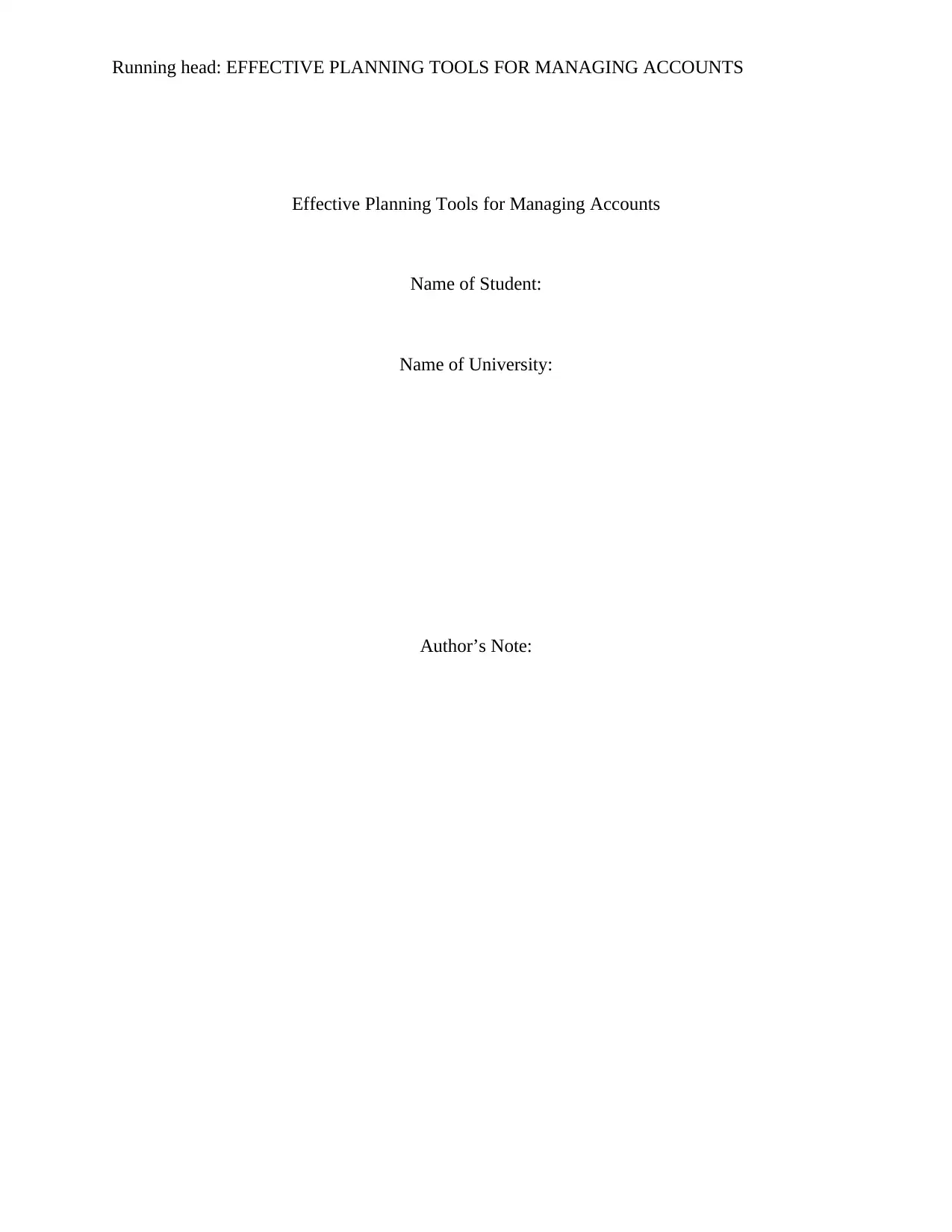
Running head: EFFECTIVE PLANNING TOOLS FOR MANAGING ACCOUNTS
Effective Planning Tools for Managing Accounts
Name of Student:
Name of University:
Author’s Note:
Effective Planning Tools for Managing Accounts
Name of Student:
Name of University:
Author’s Note:
Paraphrase This Document
Need a fresh take? Get an instant paraphrase of this document with our AI Paraphraser
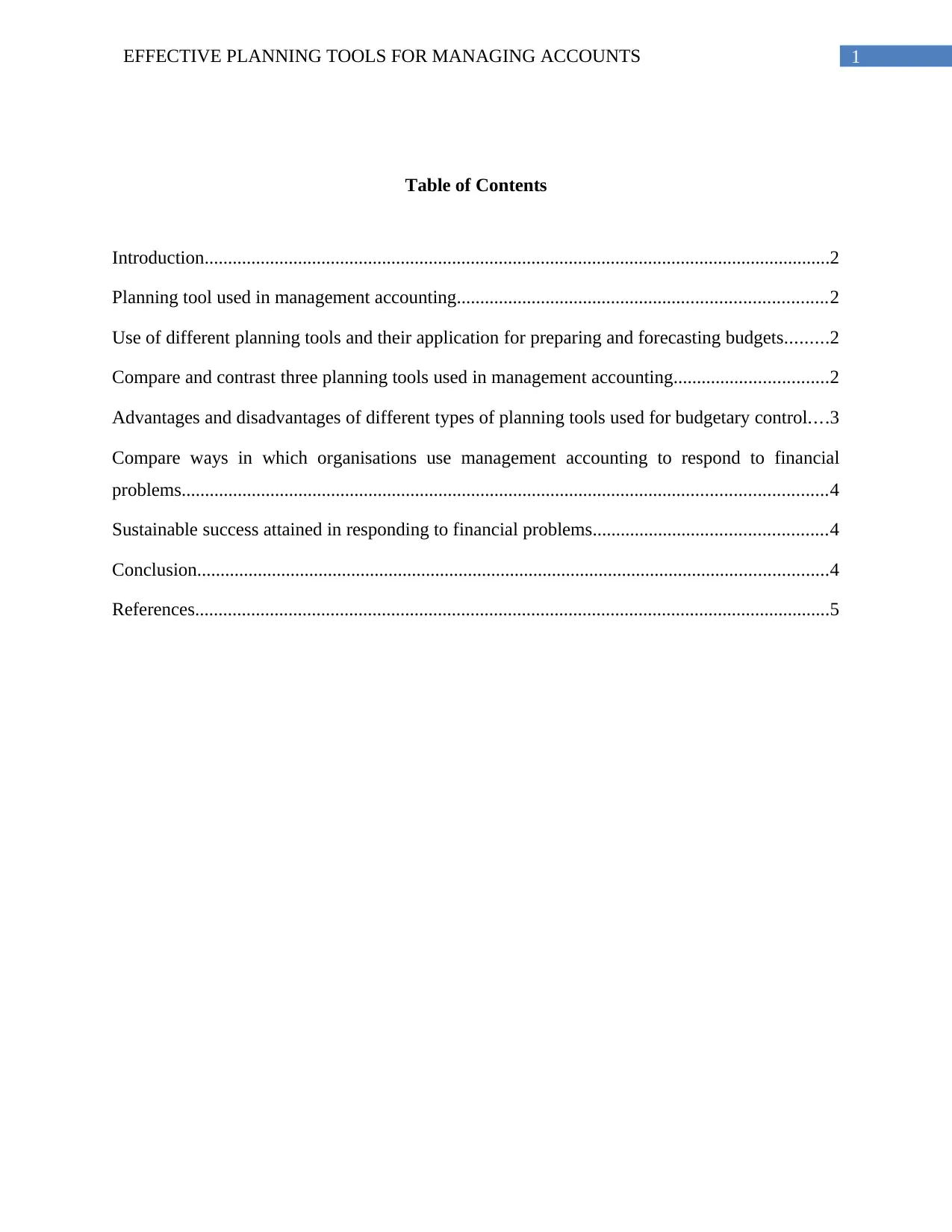
1EFFECTIVE PLANNING TOOLS FOR MANAGING ACCOUNTS
Table of Contents
Introduction......................................................................................................................................2
Planning tool used in management accounting...............................................................................2
Use of different planning tools and their application for preparing and forecasting budgets.........2
Compare and contrast three planning tools used in management accounting.................................2
Advantages and disadvantages of different types of planning tools used for budgetary control....3
Compare ways in which organisations use management accounting to respond to financial
problems..........................................................................................................................................4
Sustainable success attained in responding to financial problems..................................................4
Conclusion.......................................................................................................................................4
References........................................................................................................................................5
Table of Contents
Introduction......................................................................................................................................2
Planning tool used in management accounting...............................................................................2
Use of different planning tools and their application for preparing and forecasting budgets.........2
Compare and contrast three planning tools used in management accounting.................................2
Advantages and disadvantages of different types of planning tools used for budgetary control....3
Compare ways in which organisations use management accounting to respond to financial
problems..........................................................................................................................................4
Sustainable success attained in responding to financial problems..................................................4
Conclusion.......................................................................................................................................4
References........................................................................................................................................5
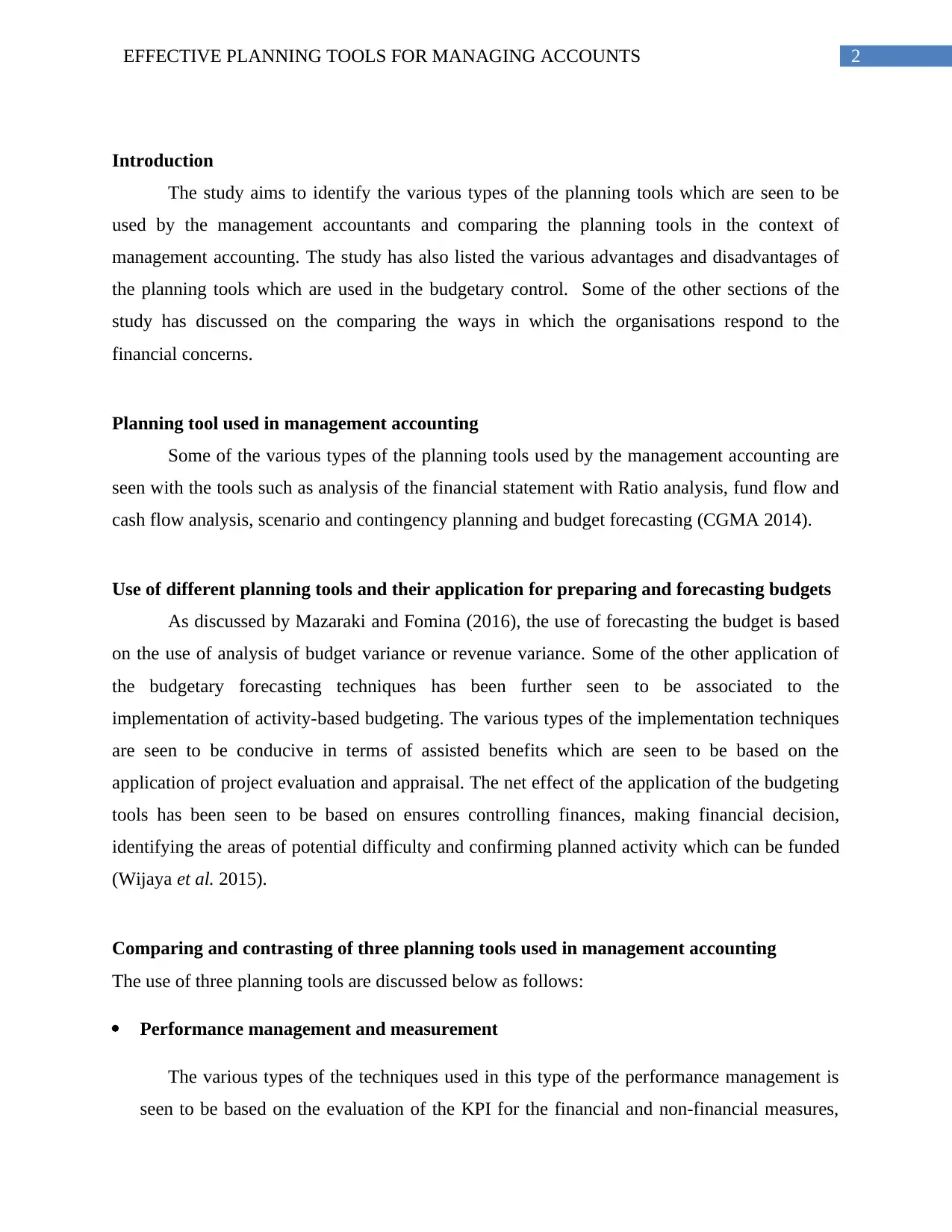
2EFFECTIVE PLANNING TOOLS FOR MANAGING ACCOUNTS
Introduction
The study aims to identify the various types of the planning tools which are seen to be
used by the management accountants and comparing the planning tools in the context of
management accounting. The study has also listed the various advantages and disadvantages of
the planning tools which are used in the budgetary control. Some of the other sections of the
study has discussed on the comparing the ways in which the organisations respond to the
financial concerns.
Planning tool used in management accounting
Some of the various types of the planning tools used by the management accounting are
seen with the tools such as analysis of the financial statement with Ratio analysis, fund flow and
cash flow analysis, scenario and contingency planning and budget forecasting (CGMA 2014).
Use of different planning tools and their application for preparing and forecasting budgets
As discussed by Mazaraki and Fomina (2016), the use of forecasting the budget is based
on the use of analysis of budget variance or revenue variance. Some of the other application of
the budgetary forecasting techniques has been further seen to be associated to the
implementation of activity-based budgeting. The various types of the implementation techniques
are seen to be conducive in terms of assisted benefits which are seen to be based on the
application of project evaluation and appraisal. The net effect of the application of the budgeting
tools has been seen to be based on ensures controlling finances, making financial decision,
identifying the areas of potential difficulty and confirming planned activity which can be funded
(Wijaya et al. 2015).
Comparing and contrasting of three planning tools used in management accounting
The use of three planning tools are discussed below as follows:
Performance management and measurement
The various types of the techniques used in this type of the performance management is
seen to be based on the evaluation of the KPI for the financial and non-financial measures,
Introduction
The study aims to identify the various types of the planning tools which are seen to be
used by the management accountants and comparing the planning tools in the context of
management accounting. The study has also listed the various advantages and disadvantages of
the planning tools which are used in the budgetary control. Some of the other sections of the
study has discussed on the comparing the ways in which the organisations respond to the
financial concerns.
Planning tool used in management accounting
Some of the various types of the planning tools used by the management accounting are
seen with the tools such as analysis of the financial statement with Ratio analysis, fund flow and
cash flow analysis, scenario and contingency planning and budget forecasting (CGMA 2014).
Use of different planning tools and their application for preparing and forecasting budgets
As discussed by Mazaraki and Fomina (2016), the use of forecasting the budget is based
on the use of analysis of budget variance or revenue variance. Some of the other application of
the budgetary forecasting techniques has been further seen to be associated to the
implementation of activity-based budgeting. The various types of the implementation techniques
are seen to be conducive in terms of assisted benefits which are seen to be based on the
application of project evaluation and appraisal. The net effect of the application of the budgeting
tools has been seen to be based on ensures controlling finances, making financial decision,
identifying the areas of potential difficulty and confirming planned activity which can be funded
(Wijaya et al. 2015).
Comparing and contrasting of three planning tools used in management accounting
The use of three planning tools are discussed below as follows:
Performance management and measurement
The various types of the techniques used in this type of the performance management is
seen to be based on the evaluation of the KPI for the financial and non-financial measures,
⊘ This is a preview!⊘
Do you want full access?
Subscribe today to unlock all pages.

Trusted by 1+ million students worldwide
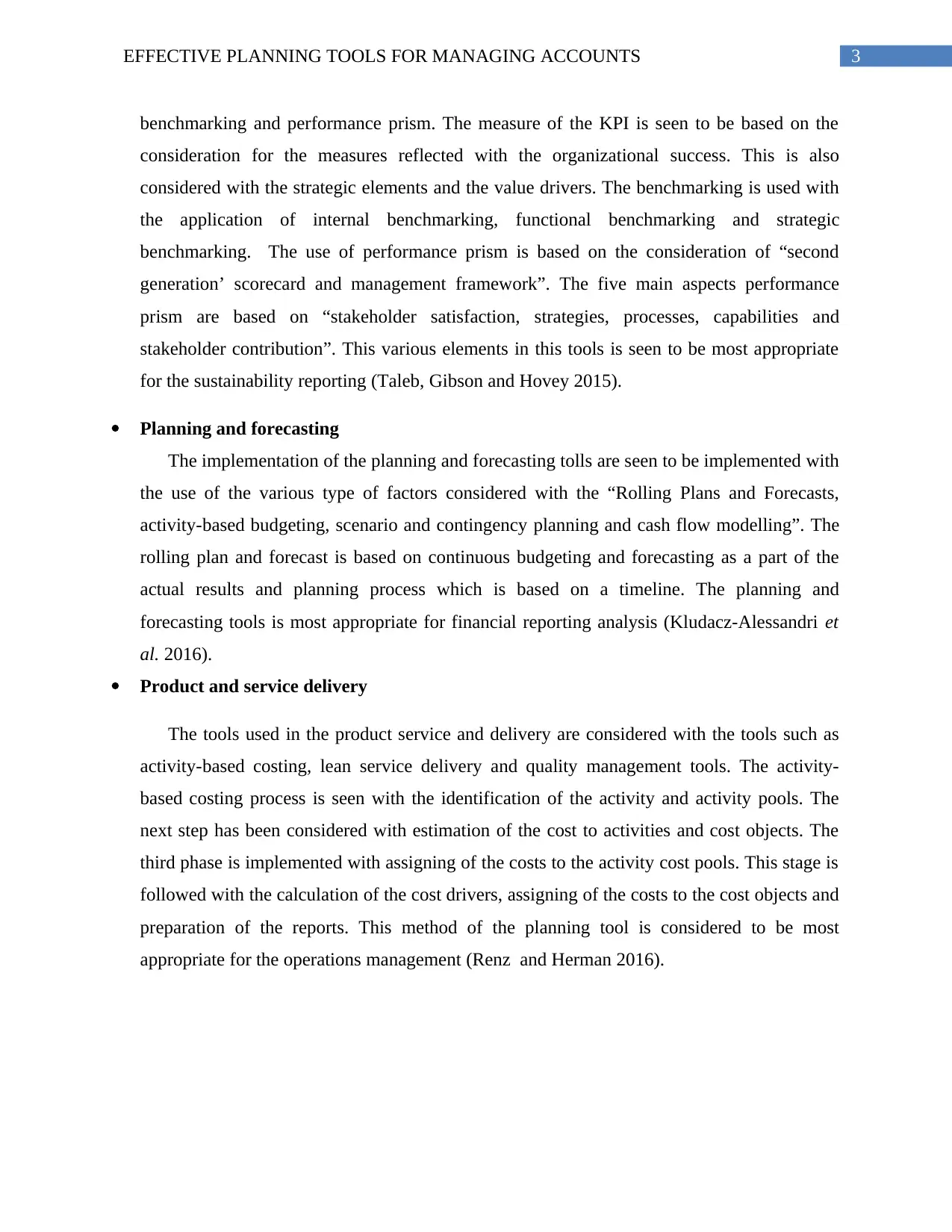
3EFFECTIVE PLANNING TOOLS FOR MANAGING ACCOUNTS
benchmarking and performance prism. The measure of the KPI is seen to be based on the
consideration for the measures reflected with the organizational success. This is also
considered with the strategic elements and the value drivers. The benchmarking is used with
the application of internal benchmarking, functional benchmarking and strategic
benchmarking. The use of performance prism is based on the consideration of “second
generation’ scorecard and management framework”. The five main aspects performance
prism are based on “stakeholder satisfaction, strategies, processes, capabilities and
stakeholder contribution”. This various elements in this tools is seen to be most appropriate
for the sustainability reporting (Taleb, Gibson and Hovey 2015).
Planning and forecasting
The implementation of the planning and forecasting tolls are seen to be implemented with
the use of the various type of factors considered with the “Rolling Plans and Forecasts,
activity-based budgeting, scenario and contingency planning and cash flow modelling”. The
rolling plan and forecast is based on continuous budgeting and forecasting as a part of the
actual results and planning process which is based on a timeline. The planning and
forecasting tools is most appropriate for financial reporting analysis (Kludacz-Alessandri et
al. 2016).
Product and service delivery
The tools used in the product service and delivery are considered with the tools such as
activity-based costing, lean service delivery and quality management tools. The activity-
based costing process is seen with the identification of the activity and activity pools. The
next step has been considered with estimation of the cost to activities and cost objects. The
third phase is implemented with assigning of the costs to the activity cost pools. This stage is
followed with the calculation of the cost drivers, assigning of the costs to the cost objects and
preparation of the reports. This method of the planning tool is considered to be most
appropriate for the operations management (Renz and Herman 2016).
benchmarking and performance prism. The measure of the KPI is seen to be based on the
consideration for the measures reflected with the organizational success. This is also
considered with the strategic elements and the value drivers. The benchmarking is used with
the application of internal benchmarking, functional benchmarking and strategic
benchmarking. The use of performance prism is based on the consideration of “second
generation’ scorecard and management framework”. The five main aspects performance
prism are based on “stakeholder satisfaction, strategies, processes, capabilities and
stakeholder contribution”. This various elements in this tools is seen to be most appropriate
for the sustainability reporting (Taleb, Gibson and Hovey 2015).
Planning and forecasting
The implementation of the planning and forecasting tolls are seen to be implemented with
the use of the various type of factors considered with the “Rolling Plans and Forecasts,
activity-based budgeting, scenario and contingency planning and cash flow modelling”. The
rolling plan and forecast is based on continuous budgeting and forecasting as a part of the
actual results and planning process which is based on a timeline. The planning and
forecasting tools is most appropriate for financial reporting analysis (Kludacz-Alessandri et
al. 2016).
Product and service delivery
The tools used in the product service and delivery are considered with the tools such as
activity-based costing, lean service delivery and quality management tools. The activity-
based costing process is seen with the identification of the activity and activity pools. The
next step has been considered with estimation of the cost to activities and cost objects. The
third phase is implemented with assigning of the costs to the activity cost pools. This stage is
followed with the calculation of the cost drivers, assigning of the costs to the cost objects and
preparation of the reports. This method of the planning tool is considered to be most
appropriate for the operations management (Renz and Herman 2016).
Paraphrase This Document
Need a fresh take? Get an instant paraphrase of this document with our AI Paraphraser
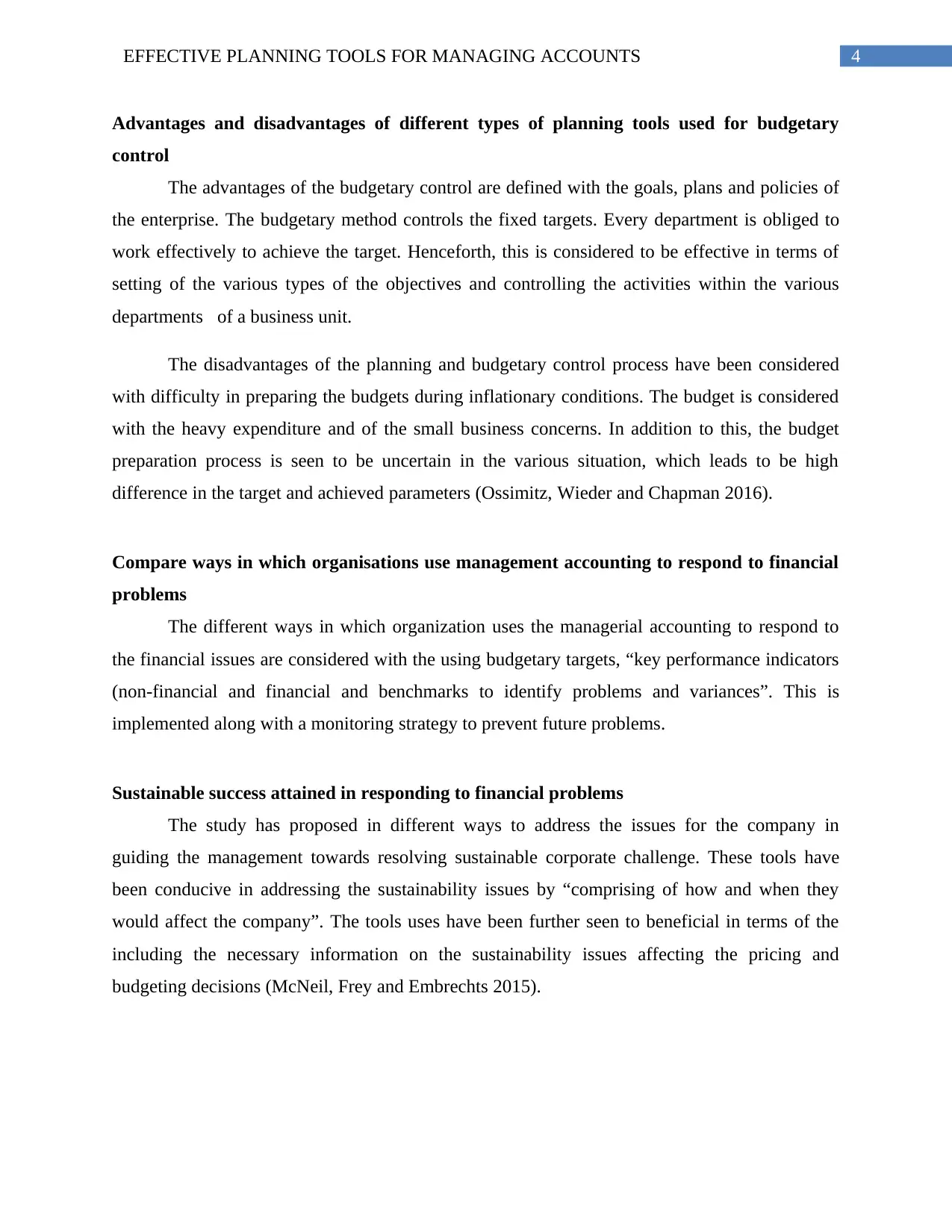
4EFFECTIVE PLANNING TOOLS FOR MANAGING ACCOUNTS
Advantages and disadvantages of different types of planning tools used for budgetary
control
The advantages of the budgetary control are defined with the goals, plans and policies of
the enterprise. The budgetary method controls the fixed targets. Every department is obliged to
work effectively to achieve the target. Henceforth, this is considered to be effective in terms of
setting of the various types of the objectives and controlling the activities within the various
departments of a business unit.
The disadvantages of the planning and budgetary control process have been considered
with difficulty in preparing the budgets during inflationary conditions. The budget is considered
with the heavy expenditure and of the small business concerns. In addition to this, the budget
preparation process is seen to be uncertain in the various situation, which leads to be high
difference in the target and achieved parameters (Ossimitz, Wieder and Chapman 2016).
Compare ways in which organisations use management accounting to respond to financial
problems
The different ways in which organization uses the managerial accounting to respond to
the financial issues are considered with the using budgetary targets, “key performance indicators
(non-financial and financial and benchmarks to identify problems and variances”. This is
implemented along with a monitoring strategy to prevent future problems.
Sustainable success attained in responding to financial problems
The study has proposed in different ways to address the issues for the company in
guiding the management towards resolving sustainable corporate challenge. These tools have
been conducive in addressing the sustainability issues by “comprising of how and when they
would affect the company”. The tools uses have been further seen to beneficial in terms of the
including the necessary information on the sustainability issues affecting the pricing and
budgeting decisions (McNeil, Frey and Embrechts 2015).
Advantages and disadvantages of different types of planning tools used for budgetary
control
The advantages of the budgetary control are defined with the goals, plans and policies of
the enterprise. The budgetary method controls the fixed targets. Every department is obliged to
work effectively to achieve the target. Henceforth, this is considered to be effective in terms of
setting of the various types of the objectives and controlling the activities within the various
departments of a business unit.
The disadvantages of the planning and budgetary control process have been considered
with difficulty in preparing the budgets during inflationary conditions. The budget is considered
with the heavy expenditure and of the small business concerns. In addition to this, the budget
preparation process is seen to be uncertain in the various situation, which leads to be high
difference in the target and achieved parameters (Ossimitz, Wieder and Chapman 2016).
Compare ways in which organisations use management accounting to respond to financial
problems
The different ways in which organization uses the managerial accounting to respond to
the financial issues are considered with the using budgetary targets, “key performance indicators
(non-financial and financial and benchmarks to identify problems and variances”. This is
implemented along with a monitoring strategy to prevent future problems.
Sustainable success attained in responding to financial problems
The study has proposed in different ways to address the issues for the company in
guiding the management towards resolving sustainable corporate challenge. These tools have
been conducive in addressing the sustainability issues by “comprising of how and when they
would affect the company”. The tools uses have been further seen to beneficial in terms of the
including the necessary information on the sustainability issues affecting the pricing and
budgeting decisions (McNeil, Frey and Embrechts 2015).
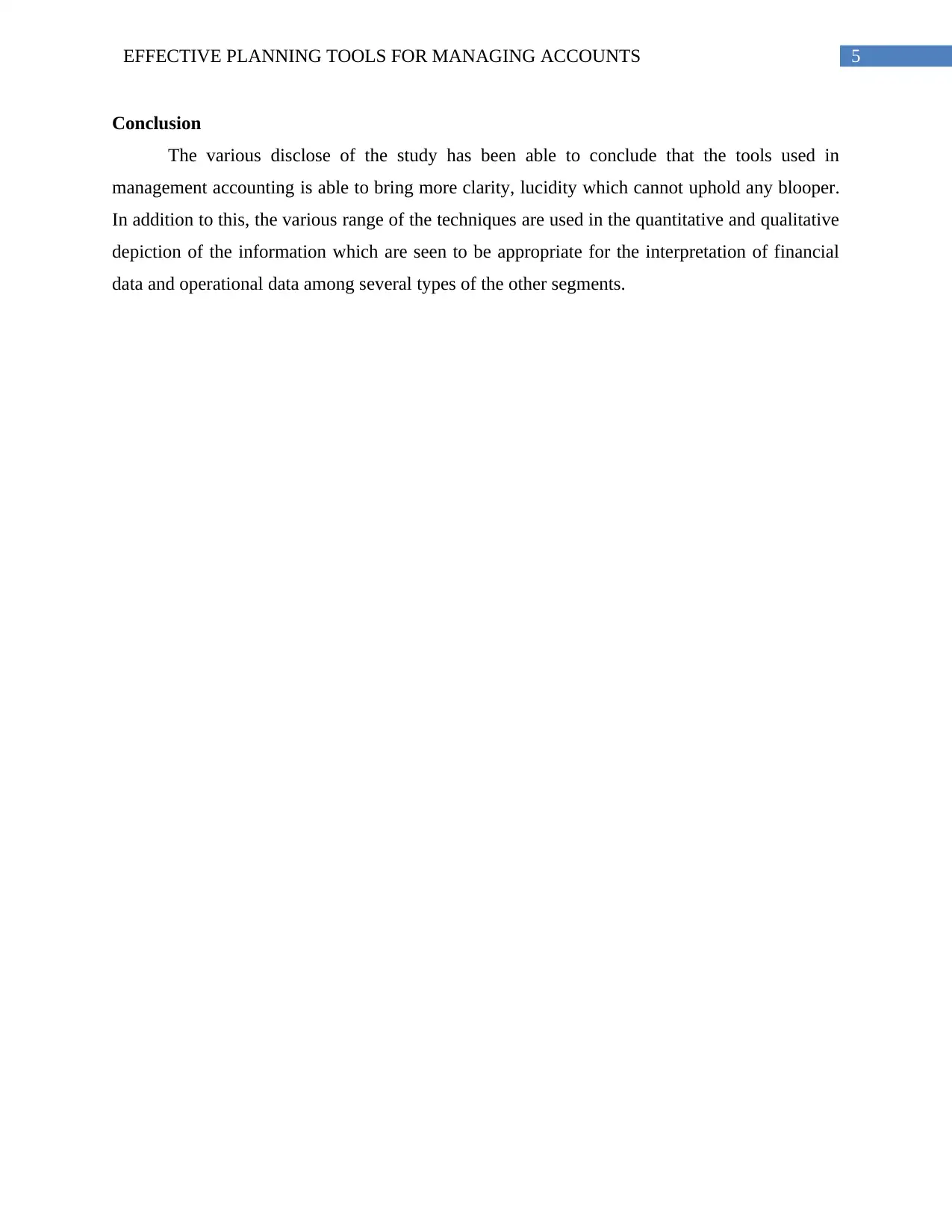
5EFFECTIVE PLANNING TOOLS FOR MANAGING ACCOUNTS
Conclusion
The various disclose of the study has been able to conclude that the tools used in
management accounting is able to bring more clarity, lucidity which cannot uphold any blooper.
In addition to this, the various range of the techniques are used in the quantitative and qualitative
depiction of the information which are seen to be appropriate for the interpretation of financial
data and operational data among several types of the other segments.
Conclusion
The various disclose of the study has been able to conclude that the tools used in
management accounting is able to bring more clarity, lucidity which cannot uphold any blooper.
In addition to this, the various range of the techniques are used in the quantitative and qualitative
depiction of the information which are seen to be appropriate for the interpretation of financial
data and operational data among several types of the other segments.
⊘ This is a preview!⊘
Do you want full access?
Subscribe today to unlock all pages.

Trusted by 1+ million students worldwide
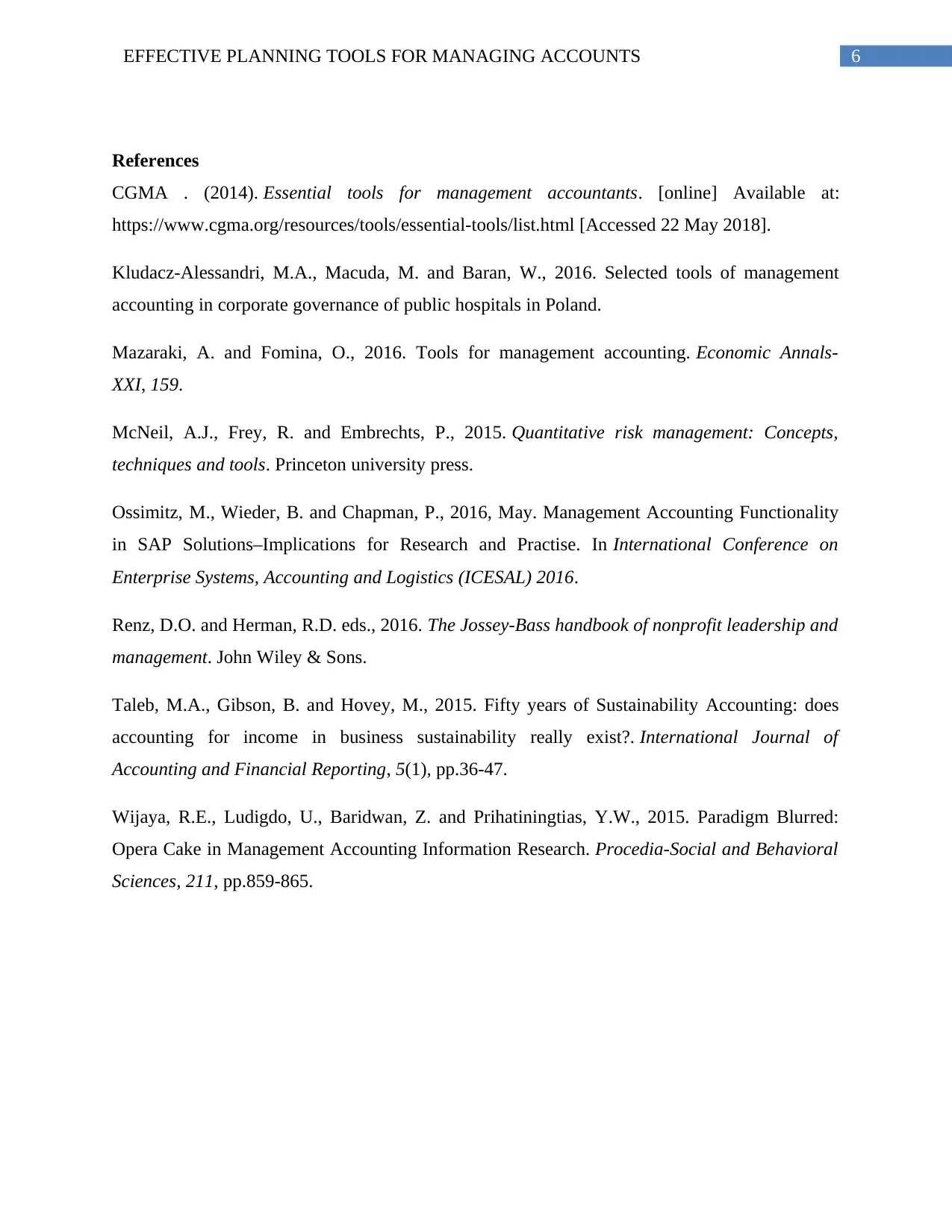
6EFFECTIVE PLANNING TOOLS FOR MANAGING ACCOUNTS
References
CGMA . (2014). Essential tools for management accountants. [online] Available at:
https://www.cgma.org/resources/tools/essential-tools/list.html [Accessed 22 May 2018].
Kludacz-Alessandri, M.A., Macuda, M. and Baran, W., 2016. Selected tools of management
accounting in corporate governance of public hospitals in Poland.
Mazaraki, A. and Fomina, O., 2016. Tools for management accounting. Economic Annals-
XXI, 159.
McNeil, A.J., Frey, R. and Embrechts, P., 2015. Quantitative risk management: Concepts,
techniques and tools. Princeton university press.
Ossimitz, M., Wieder, B. and Chapman, P., 2016, May. Management Accounting Functionality
in SAP Solutions–Implications for Research and Practise. In International Conference on
Enterprise Systems, Accounting and Logistics (ICESAL) 2016.
Renz, D.O. and Herman, R.D. eds., 2016. The Jossey-Bass handbook of nonprofit leadership and
management. John Wiley & Sons.
Taleb, M.A., Gibson, B. and Hovey, M., 2015. Fifty years of Sustainability Accounting: does
accounting for income in business sustainability really exist?. International Journal of
Accounting and Financial Reporting, 5(1), pp.36-47.
Wijaya, R.E., Ludigdo, U., Baridwan, Z. and Prihatiningtias, Y.W., 2015. Paradigm Blurred:
Opera Cake in Management Accounting Information Research. Procedia-Social and Behavioral
Sciences, 211, pp.859-865.
References
CGMA . (2014). Essential tools for management accountants. [online] Available at:
https://www.cgma.org/resources/tools/essential-tools/list.html [Accessed 22 May 2018].
Kludacz-Alessandri, M.A., Macuda, M. and Baran, W., 2016. Selected tools of management
accounting in corporate governance of public hospitals in Poland.
Mazaraki, A. and Fomina, O., 2016. Tools for management accounting. Economic Annals-
XXI, 159.
McNeil, A.J., Frey, R. and Embrechts, P., 2015. Quantitative risk management: Concepts,
techniques and tools. Princeton university press.
Ossimitz, M., Wieder, B. and Chapman, P., 2016, May. Management Accounting Functionality
in SAP Solutions–Implications for Research and Practise. In International Conference on
Enterprise Systems, Accounting and Logistics (ICESAL) 2016.
Renz, D.O. and Herman, R.D. eds., 2016. The Jossey-Bass handbook of nonprofit leadership and
management. John Wiley & Sons.
Taleb, M.A., Gibson, B. and Hovey, M., 2015. Fifty years of Sustainability Accounting: does
accounting for income in business sustainability really exist?. International Journal of
Accounting and Financial Reporting, 5(1), pp.36-47.
Wijaya, R.E., Ludigdo, U., Baridwan, Z. and Prihatiningtias, Y.W., 2015. Paradigm Blurred:
Opera Cake in Management Accounting Information Research. Procedia-Social and Behavioral
Sciences, 211, pp.859-865.
1 out of 7
Related Documents
Your All-in-One AI-Powered Toolkit for Academic Success.
+13062052269
info@desklib.com
Available 24*7 on WhatsApp / Email
![[object Object]](/_next/static/media/star-bottom.7253800d.svg)
Unlock your academic potential
Copyright © 2020–2025 A2Z Services. All Rights Reserved. Developed and managed by ZUCOL.





